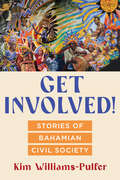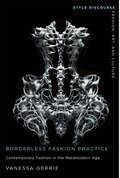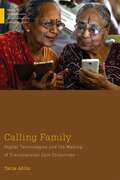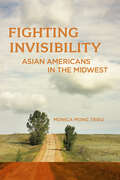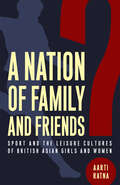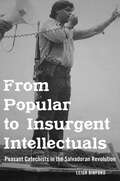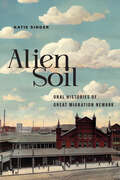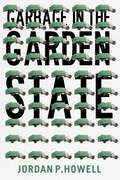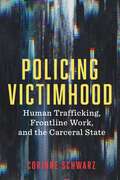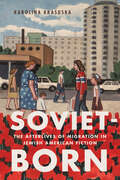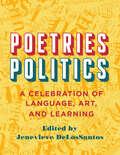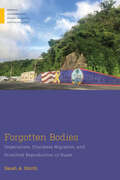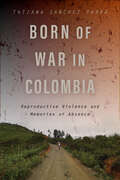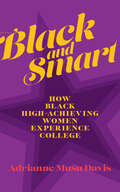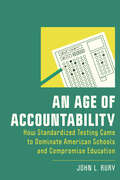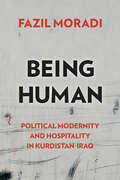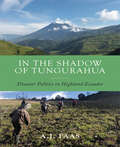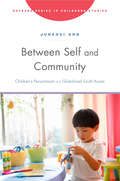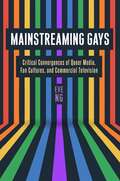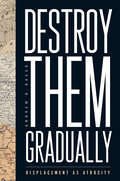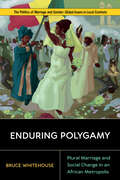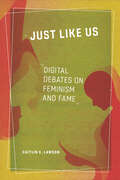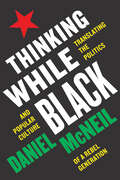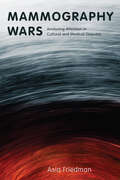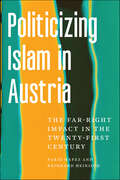- Table View
- List View
Get Involved!: Stories of Bahamian Civil Society (Critical Caribbean Studies)
by Kim Williams-PulferPhilanthropy is commonly depicted as a universal practice and is either valued for supporting community transformation or critiqued for limiting social justice. However, dominant definitions and even popular connotations tend to privilege wealthy Western approaches. Using the Caribbean as a rich site of observance and concentrating on the island nation-state of The Bahamas, Get Involved! uncovers the hidden and under-documented activities of “philanthropy from below,” revealing a broader conception of philanthropy and civil society, especially within Black and other historically marginalized populations. Kim Williams-Pulfer draws on narrative analysis from enslavement to the current post-post-colonial moment, depicting the repertoires and practices of primarily Afro-Bahamians through the stories emerging from history (including the transnational observations of Zora Neale Hurston, social movements, and political and social institution building), the arts (from Junkanoo, literature, and visual practices), to the lived experiences of contemporary civil society leaders. Get Involved! shows the long history and continued significance of civil society and philanthropic engagement in The Bahamas, the circum-Caribbean, and the wider African Diaspora. Junkanoo is the national cultural festival of The Bahamas. It fosters a sense of community pride, identity, companionship, spirituality and unity. Watch a video about Junknoo: https://www.youtube.com/watch?v=tnMpMesNb1Q&t=14s
Borderless Fashion Practice: Contemporary Fashion in the Metamodern Age
by Vanessa GerrieTwenty-first century fashion practice has become increasingly borderless and diverse in the digital era, calling into question the very boundaries that define fashion in the Western cultural context. Borderless Fashion Practice: Contemporary Fashion in the Metamodern Age principally engages the work of four fashion designers -- Virgil Abloh, Aitor Throup, Iris Van Herpen, and Eckhaus Latta -- whose work intersects with other creative disciplines such as art, technology, science, architecture, and graphic design. They do their work in what Vanessa Gerrie calls the metamodern age -- the time and place where the polarization between the modern and the postmodern collapses. Used as a framework to understand the current Western cultural zeitgeist, Gerrie's exploration of the work of contemporary practitioners and theorists finds blurred borders and seeks to blur them further, to the point of erasure.
Calling Family: Digital Technologies and the Making of Transnational Care Collectives (Medical Anthropology)
by Tanja AhlinHow do digital technologies shape both how people care for each other and, through that, who they are? With technological innovation is on the rise and increasing migration introducing vast distances between family members--a situation additionally complicated by the COVID-19 pandemic and the requirements of physical distancing, especially for the most vulnerable – older adults--this is a pertinent question. Through ethnographic fieldwork among families of migrating nurses from Kerala, India, Tanja Ahlin explores how digital technologies shape elder care when adult children and their aging parents live far apart. Coming from a country in which appropriate elder care is closely associated with co-residence, these families tinker with smartphones and social media to establish how care at a distance can and should be done to be considered good. Through the notion of transnational care collectives, Calling Family uncovers the subtle workings of digital technologies on care across countries and continents when being physically together is not feasible. Calling Family provides a better understanding of technological relationality that can only be expected to further intensify in the future.
Fighting Invisibility: Asian Americans in the Midwest
by Monica Mong TrieuIn Fighting Invisibility, Monica Mong Trieu argues that we must consider the role of physical and symbolic space to fully understand the nuances of Asian American racialization. By doing this, we face questions such as, historically, who has represented Asian America? Who gets to represent Asian America? This book shifts the primary focus to Midwest Asian America to disrupt—and expand beyond—the existing privileged narratives in United States and Asian American history. Drawing from in-depth interviews, census data, and cultural productions from Asian Americans in Ohio, Wisconsin, Nebraska, Minnesota, Illinois, Iowa, Indiana, and Michigan, this interdisciplinary research examines how post-1950s Midwest Asian Americans navigate identity and belonging, racism, educational settings, resources within co-ethnic communities, and pan-ethnic cultural community. Their experiences and life narratives are heavily framed by three pervasive themes of spatially defined isolation, invisibility, and racialized visibility. Fighting Invisibility makes an important contribution to racialization literature, while also highlighting the necessity to further expand the scope of Asian American history-telling and knowledge production.
A Nation of Family and Friends?: Sport and the Leisure Cultures of British Asian Girls and Women (Critical Issues in Sport and Society)
by Aarti RatnaIn A Nation of Family and Friends, sociologist Aarti Ratna examines the complex and dynamic relationships between South Asian women and sporting and leisure cultures. Mining autobiographical insights (as a South Asian scholar living in the UK) she links the chapters of this innovative book using the sociological concepts of family and friends, particularly as they relate to an analysis of wider debates about the complexities of race, gender, and the nation. Ratna underscores the importance of studying informal spaces of sport and leisure as friendly, familial, sociable, and political spaces. She simultaneously highlights the role of earlier sociological research in disseminating myths about South Asian women as too physically weak to play competitive sports; culturally passive victims of South Asian cultures and religions; and as sexually exotic women requiring saving through colonial and imperial projects led by white men and women. Ratna also examines two key cultural objects - the popular films "Bend it Like Beckham" and “Dhan Dhana Dhan Goal” - to examine in detail the gendered representation of South Asian soccer players’ engagement in amateur and elite levels of the sport. She critiques studies of women’s football fandom and sport that fail to acknowledge social differences relating to race, class, age, disability, and sexuality. By linking the social forces (across time and space) that differentially affect their sporting choices and leisure lifestyles, Ratna portrays the women of the South Asian diaspora as active agents in the shaping of their life courses and as skilled navigators of the complexities affecting their own identities. Ultimately Ratna examines the intersections of class, caste, age, generation, gender, and sexuality, to provide a rich and critical exploration of British Asian women's sport and leisure choices, pleasures, and lived realities.
From Popular to Insurgent Intellectuals: Peasant Catechists in the Salvadoran Revolution
by Leigh BinfordFrom Popular to Insurgent Intellectuals explains how a group of Catholic lay catechists educated in liberation theology came to take up arms and participate on the side of the rebel FMLN during El Salvador’s revolutionary war (1980-92). In the process they became transformed from popular intellectuals to insurgent intellectuals who put their organizational and cognitive skills at the service of a collective effort to create a more egalitarian and democratic society. The book highlights the key roles that peasant catechists in northern Morazán played in disseminating liberation theology before the war and supporting the FMLN during it—as quartermasters, political activists, and musicians, among other roles. Throughout, From Popular to Insurgent Intellectuals highlights the dialectical nature of relations between Catholic priests and urban revolutionaries, among others, in which the latter learned from the former and vice-versa. Peasant catechists proved capable at making independent decisions based on assessment of their needs and did not simply follow the dictates of those with superior authority, and played an important role for the duration of the twelve-year military conflict.
Alien Soil: Oral Histories of Great Migration Newark (CERES: Rutgers Studies in History)
by Katie SingerAlien Soil: Oral Histories of Great Migration Newark explores Newark’s Krueger-Scott African-American Cultural Center collection of over 100 oral histories. Historian Katie Singer separates these stories into thematic categories of social and political events, including church, work, and activism, in order to paint an intimate portrait of everyday urbanity and the larger Black urban experience in Newark. Through the examination of these Krueger-Scott narratives, Singer challenges historical falsehoods with the lived experiences of Newarkers who traveled North during the Great Migration, as well as established city residents. Alien Soil effectively contextualizes Newark history and re-inserts Black voices into historiography traditionally dominated by “outsiders." The book begins with the Krueger-Scott Mansion’s deep history, followed by the sequence of events surrounding the proposed Cultural Center. Last owned by African-American millionaire and beauty-culture entrepreneur Louise Scott, the Victorian Krueger-Scott Mansion was built by beer baron Gottfried Krueger in 1888. Through the history of the Mansion, and the ultimately failed Cultural Center project, one learns about the Newark that African Americans migrated to, what they found when they got there, how living in the city changed them, and how they, individually and collectively, changed Newark. After the Cultural Center project was officially halted in 2000, the cassette tapes of the oral history interviews were stored away at the Newark Public Library. Ten years later they were unearthed, and ultimately digitized. As of yet, no one has applied these sources directly to their research. Deeply committed to these rich, insightful stories, Singer calls for a more thoughtful consideration of all cities, reminding us that Newark is much more than its 1967 rebellion.
Garbage in the Garden State (CERES: Rutgers Studies in History)
by Jordan P. HowellGarbage in the Garden State is the only book to examine the history of waste management in New Jersey. The state has played a pioneering role in the overall trajectory of waste management in the US. Howell's book is unique in the way that it places the contemporary challenges of waste management into their proper historical context – for instance, why does the system for recycling seem to work so poorly? Why do we have so many landfills in New Jersey, but also simultaneously not enough landfills or incinerators? Howell acknowledges that New Jersey is sometimes imagined, particularly by non-New Jerseyans, as a giant garbage dump for New York and Philadelphia. But every place has had to struggle with the challenges of waste management. New Jersey's trash history is in fact more interesting and more important than most. New Jersey’s waste history includes intensive planning, deep-seated political conflict, organized crime, and literally every level of state and federal judiciary. It is a colorful history, to say the least, and one that includes a number of firsts with regard to recycling, comprehensive planning, and the challenging economics of trash.
Policing Victimhood: Human Trafficking, Frontline Work, and the Carceral State (Critical Issues in Crime and Society)
by Corinne SchwarzSince the turn of the twentieth century, human trafficking has animated public discourses, policy debates, and moral panics in the United States. Though some nuances of these conversations have shifted, the role of the criminal legal system (police officers, investigators, lawyers, and connected service providers) in anti-trafficking interventions has remained firmly in place. Policing Victimhood explores how frontline workers in direct contact with vulnerable, exploited, and trafficked persons—however those groups are defined at personal, organizational, or legal levels—defer to the tools of the carceral state and ideologies of punishment when navigating their clients’ needs. In Policing Victimhood, Corinne Schwarz interviewed with service providers in the Midwestern US, a region that, though colloquially understood as “flyover country,” regularly positions itself as a leader in state-level anti-trafficking policies and collaborative networks. These frontline workers’ perceptions and narratives are informed by their interpersonal, day-to-day encounters with exploited or trafficked persons. Their insights underscore how anti-trafficking policies are put into practice and influenced by specific ideologies and stereotypes. Extending the reach of street-level bureaucracy theory to anti-trafficking initiatives, Schwarz demonstrates how frontline workers are uniquely positioned to perpetuate or radically counter punitive anti-trafficking efforts. Taking a cue from anti-carceral feminist critiques and critical trafficking studies, Schwarz argues that ongoing anti-trafficking efforts in the US expand the punitive arm of the state without addressing the role of systemic oppression in perpetuating violence. The violence inherent to the carceral state—and required for its continued expansion—is the same violence that perpetuates the exploitation of human trafficking. In order to solve the “problem” of human trafficking, advocates, activists, and scholars must divest from systems that center punishment and radically reinvest their efforts in dismantling the structural violence that perpetuates social exclusion and vulnerability, what she calls the “-isms” and “-phobias” that harm some at the expense of others’ empowerment. Policing Victimhood encourages readers to imagine a world without carceral violence in any of its forms.
Soviet-Born: The Afterlives of Migration in Jewish American Fiction
by Karolina KrasuskaIn 2010, when The New Yorker published a list of twenty writers under the age of forty who were “key to their generation,” it included five Jewish-identified writers, two of whom—American Gary Shteyngart and Canadian David Bezmozgis—were Soviet-born. This publicity came after nearly a decade of English-language literary output by Soviet-born writers of all genders in North America. Soviet-Born: The Afterlives of Migration in Jewish American Fiction traces the impact of these now numerous authors—among others, David Bezmozgis, Boris Fishman, Keith Gessen, Sana Krasikov, Ellen Litman, Gary Shteyngart, Anya Ulinich, and Lara Vapnyar—on major coordinates of the Jewish American imaginary. Entering an immigrant, Soviet-born standpoint creates an alternative and sometimes complementary pattern of how the Eastern and Central European past and present resonate with American Jewishness. The novels, short stories, and graphic novels considered here often stage strikingly fresh variations on key older themes, including cultural geography, the memory of World War II and the Holocaust, communism, gender and sexuality, genealogy, and finally, migration. Soviet-Born demonstrates how these diasporic writers, with their critical stance toward identity categories, open up the field of what is canonically Jewish American to broader contemporary debates. This book is also freely available online as an open-access digital edition.
Poetries - Politics: A Celebration of Language, Art, and Learning
by Mary Shaw Francois Cornilliat Atif Atkin Ouafaa Deleger Ian Lovoulos Devon Monaghan Jenevieve DeLosSantosPoetries – Politics: A Celebration of Language, Art, and Learning celebrates the best of innovative humanities pedagogy and creative graphic design. Designed and implemented during a time of political divisiveness, the Poetries – Politics project created a space of inviting, multilingual walls on the Rutgers campus, celebrating diversity, community, and cross-cultural exchange. This book, like the original project, provides a platform for the incredible generative power of student-led work. Essays feature the perspectives of three students and professors originally involved in the project, reflecting on their learning and exploring the works they selected for the original exhibition. The essays lead to a beautifully illustrated catalogue of the original student designs. Reproduced in full color and with the accompanying poems in both their original language and a translation, this catalogue commemorates the incredible creative spirit of the project and provides a new way of contemplating these great poetic works.
Forgotten Bodies: Imperialism, Chuukese Migration, and Stratified Reproduction in Guam (Medical Anthropology)
by Sarah A. SmithWomen from Chuuk, Federated States of Micronesia, who migrate to Guam, a U.S. territory, suffer disproportionately poor reproductive health outcomes. Though their access to the United States is unusually easy, through a unique migration agreement, it keeps them in a perpetual liminal state as nonimmigrants, who never fully belong as part of the United States Chuukese women move to Guam, sometimes with their families but sometimes alone, in search of a better life: for jobs, for the education system, or to access safe health care. Yet, the imperial system they encounter creates underlying conditions that greatly and disproportionately impact their ability to succeed and thrive, negatively impacting their reproductive health. Through clinical and community ethnography, Sarah A. Smith illuminates the way this system stratifies women’s reproduction at structural, social, and individual levels. Readers can visualize how U.S. imperialist policies of benign neglect control the body politic, change the social body, and render individual bodies vulnerable in the twenty-first century but also how people resist.
Born of War in Colombia: Reproductive Violence and Memories of Absence (Genocide, Political Violence, Human Rights)
by Tatiana Sanchez ParraBorn of War in Colombia addresses why people born of conflict-related sexual violence remain unseen within transitional justice agendas. In Colombia, there are generations of children born of conflict-related sexual violence across the country. Whispers of their presence have traveled outside their communities. They also exist within the country’s domestic reparations program, which entitles them to reparations. Drawing on an immersive feminist ethnography with a community that endured a paramilitary confinement, the book reveals how a past-oriented and harm-centered model of transitional justice has converged with a restricted notion of gendered victimhood and the patriarchal politics of reproduction to render the bodies and experiences of people born of conflict-related sexual violence unintelligible to those seeking to understand and address the consequences of war in Colombia.
Black and Smart: How Black High-Achieving Women Experience College (The American Campus)
by Adrianne Musu DavisEven academically talented students face challenges in college. For high-achieving Black women, their racial, gender, and academic identities intensify those issues. Inside the classroom, they are spotlighted and feel forced to be representatives for their identity groups. In campus life, they are isolated and face microaggressions from peers. Using intersectionality as a theoretical framework, Davis addresses the significance of the various identities of high-achieving Black women in college individually and collectively, revealing the ways institutional oppression functions at historically white institutions and in social interactions on and off campus. Based on interviews with collegiate Black women in honors communities, Black and Smart analyzes the experiences of academically talented Black undergraduate women navigating their social and academic lives at urban historically white institutions and offers strategies for creating more inclusive academic and social environments for talented undergraduates.
An Age of Accountability: How Standardized Testing Came to Dominate American Schools and Compromise Education (New Directions in the History of Education)
by John L. RuryAn Age of Accountability highlights the role of test-based accountability as a policy framework in American education from 1970 to 2020. For more than half a century, the quest to hold schools and educators accountable for academic achievement has relied almost exclusively on standardized assessment. The theory of change embedded in almost all test-based accountability programs held that assessment with stipulated consequences could lead to major improvements in schools. This was accomplished politically by proclaiming lofty goals of attaining universal proficiency and closing achievement gaps, which repeatedly failed to materialize. But even after very clear disappointments, no other policy framework has emerged to challenge its hegemony. The American public today has little confidence in institutions to improve the quality of goods and services they provide, especially in the public sector. As a consequence, many Americans continue to believe that accountability remains a vital necessity, even if educators and policy scholars disagree.
Being Human: Political Modernity and Hospitality in Kurdistan-Iraq (Genocide, Political Violence, Human Rights)
by Fazil MoradiThe Iraqi Baʿth state’s Anfāl operations (1987-1991) is one of the twentieth century’s ultimate acts of destruction of the possibility of being human. It remains the first and only crime of state in the Middle East to be tried under the 1948 UN Genocide Convention, the 1950 Nuremberg Principles, and the 1969 Iraqi Penal Code and to be recognized as genocide, crimes against humanity, and war crimes in Baghdad between 2006 and 2007. Being Human: Political Modernity and Hospitality in Kurdistan-Iraq offers an unprecedented pathway to the study of political violence. It is a sweeping work of anthropological hospitality, returning to the Anfāl operations as the violence of political modernity only to turn to the human survivors’ hospitality and acts of translation—testimonial narratives, law, politics, archive, poetry, artworks, museums, memorials, symbolic cemeteries, and infinite pursuit of justice in the Kurdistan Region of Iraq. Being Human gathers together social sciences, humanities, and the arts to understand modernity's violence and its living on.
In the Shadow of Tungurahua: Disaster Politics in Highland Ecuador
by A.J. FaasIn the Shadow of Tungurahua relates the stories of the people of Penipe, Ecuador living in and between several villages around the volcano Tungurahua and two resettlement communities built for people displaced by government operations following volcanic eruptions in 1999 and 2006. The stories take shape in ways that influence prevailing ideas about how disasters are produced and reproduced, in this case by shifting assemblages of the state first formed during Spanish colonialism attempting to settle (make “legible”) and govern Indigenous and campesino populations and places. The disasters unfolding around Tungurahua at the turn of the 21st century also provide lessons in the humanitarian politics of disaster—questions of deservingness, reproducing inequality, and the reproduction of bare life. But this is also a story of how people responded to confront hardships and craft new futures, about forms of cooperation to cope with and adapt to disaster, and the potential for locally derived disaster recovery projects and politics.
Between Self and Community: Children’s Personhood in a Globalized South Korea (Rutgers Series in Childhood Studies)
by Junehui AhnBetween Self and Community investigates the early childhood socialization process in a rapidly changing, globalizing South Korea. Based on long-term ethnographic fieldwork in a South Korean preschool, it shows how both children and teachers interactively navigate, construct, and reconstruct their own multifaceted and sometimes conflicting models of what makes “a good child” amid Korea’s shifting educational and social contexts. Junehui Ahn details the conflicting and competing ways in which the ideologies of new personhood are enacted in actual everyday socialization contexts and reveals the confusions, dilemmas, and ruptures that occur when globally dominant ideals of childhood development are superimposed onto local experiences. Between Self and Community pays special attention to the way children, as active agents of socialization, create, construe, and sustain their own meanings of their personhood, thereby highlighting the dynamism children and their culturally rich peer world create in South Korea’s shifting socialization terrain.
Mainstreaming Gays: Critical Convergences of Queer Media, Fan Cultures, and Commercial Television
by Eve NgMainstreaming Gays discusses a key transitional period linking the eras of legacy and streaming, analyzing how queer production and interaction that had earlier occurred outside the mainstream was transformed by multiple converging trends: the emergence of digital media, the rising influence of fan cultures, and increasing interest in LGBTQ content within commercial media. The U.S. networks Bravo and Logo broke new ground in the early 2000s and 2010s with their channel programming, as well as bringing in a new cohort of LGBTQ digital content creators, providing unprecedented opportunities for independent queer producers, and hosting distinctive spaces for queer interaction online centered on pop culture and politics rather than dating. These developments constituted the ground from which recent developments for LGBTQ content and queer sociality online have emerged. Mainstreaming Gays is critical reading for those interested in media production, fandom, subcultures, and LGBTQ digital media.
Destroy Them Gradually: Displacement as Atrocity (Genocide, Political Violence, Human Rights)
by Andrew R. BassoPerpetrators of mass atrocities have used displacement to transport victims to killing sites or extermination camps to transfer victims to sites of forced labor and attrition, to ethnically homogenize regions by moving victims out of their homes and lands, and to destroy populations by depriving them of vital daily needs. Displacement has been treated as a corollary practice to crimes committed, not a central aspect of their perpetration. Destroying Them Gradually examines four cases that illuminate why perpetrators have destroyed populations using displacement policies: Germany’s genocide of the Herero (1904–1908); Ottoman genocides of Christian minorities (1914–1925); expulsions of Germans from East/Central Europe (1943–1952); and climate violence (twenty-first century). Because displacement has been typically framed as a secondary aspect of mass atrocities, existing scholarship overlooks how perpetrators use it as a means of executing destruction rather than a vehicle for moving people to a specific location to commit atrocities.
Enduring Polygamy: Plural Marriage and Social Change in an African Metropolis (Politics of Marriage and Gender: Global Issues in Local Contexts)
by Bruce WhitehouseWhy hasn’t polygamous marriage died out in African cities, as experts once expected it would? Enduring Polygamy considers this question in one of Africa’s fastest-growing cities: Bamako, the capital of Mali, where one in four wives is in a polygamous marriage. Using polygamy as a lens through which to survey sweeping changes in urban life, it offers ethnographic and demographic insights into the customs, gender norms and hierarchies, kinship structures, and laws affecting marriage, and situates polygamy within structures of inequality that shape marital options, especially for young Malian women. Through an approach of cultural relativism, the book offers an open-minded but unflinching perspective on a contested form of marriage. Without shying away from questions of patriarchy and women’s oppression, it presents polygamy from the everyday vantage points of Bamako residents themselves, allowing readers to make informed judgments about it and to appreciate the full spectrum of human cultural diversity.
Just Like Us: Digital Debates on Feminism and Fame
by Caitlin E. LawsonIn Just Like Us: Digital Debates on Feminism and Fame, Caitlin E. Lawson examines the rise of celebrity feminism, its intersections with digital culture, and its complicated relationships with race, sexuality, capitalism, and misogyny. Through in-depth analyses of debates across social media and news platforms, Lawson maps the processes by which celebrity culture, digital platforms, and feminism transform one another. As she analyzes celebrity-centered stories ranging from “The Fappening” and the digital attack on actress Leslie Jones to stars’ activism in response to #MeToo, Lawson demonstrates how celebrity culture functions as a hypervisible space in which networked publics confront white feminism, assert the value of productive anger in feminist politics, and seek remedies for women’s vulnerabilities in digital spaces and beyond. Just Like Us asserts that, together, celebrity culture and digital platforms form a crucial discursive arena where postfeminist logics are unsettled, opening up more public, collective modes of holding individuals and groups accountable for their actions.
Thinking While Black: Translating the Politics and Popular Culture of a Rebel Generation
by Daniel McNeilThinking While Black brings together the work and ideas of the most notorious film critic in America, one of the most influential intellectuals in the United Kingdom, and a political and cultural generation that consumed images of rebellion and revolution around the world as young Black teenagers in the late 1960s. Drawing on hidden and little known archives of resistance and resilience, it sheds new light on the politics and poetics of young people who came together, often outside of conventional politics, to rock against racism in the 1970s and early ‘80s. It re-examines debates in the 1980s and ‘90s about artists who “spread out” to mount aggressive challenges to a straight, white, middle-class world, and entertainers who “sold out” to build their global brands with performances that attacked the Black poor, rejected public displays of introspection, and expressed unambiguous misogyny and homophobia. Finally, it thinks with and through the work of writers who have been celebrated and condemned as eminent intellectuals and curmudgeonly contrarians in the twenty-first century. In doing so, it delivers the smartest and most nuanced investigation into thinkers such as Paul Gilroy and Armond White as they have evolved from “young soul rebels” to “middle-aged mavericks” and “grumpy old men,” lamented the debasement and deskilling of Black film and music in a digital age, railed against the discourteous discourse and groupthink of screenies and Internet Hordes, and sought to stimulate some deeper and fresher thinking about racism, nationalism, multiculturalism, political correctness and social media. Listen along with this Spotify playlist inspired by the book! For copyright reasons, this book is available in the U.S.A only.
Mammography Wars: Analyzing Attention in Cultural and Medical Disputes (Critical Issues in Health and Medicine)
by Asia FriedmanMammography is a routine health screening performed forty million times each year in the United States, yet it remains one of the most deeply contested topics in medicine, with national health care organizations supporting conflicting guidelines. In Mammography Wars, sociologist Asia Friedman examines cultural and medical disagreements over mammography. At issue is whether to screen women under age fifty, which is rooted in deeper questions about early detection and the assumed linear and progressive development of breast cancer. Based on interviews with doctors and scientists, interviews with women ages 40 to 50, and newspaper coverage of mammography, Friedman uses the sociology of attention to map the cognitive structure of the “mammography wars,” offering insights into the entrenched nature of debates over mammography that often get missed when applying a medical lens. Friedman’s analysis also suggests the sociology of attention’s unique potential for analyzing cultural conflicts beyond mammography, and even beyond medicine.
Politicizing Islam in Austria: The Far-Right Impact in the Twenty-First Century
by Reinhard Heinisch Farid HafezAmong its Continental peers, Austria has stood out for its longstanding state recognition of the Muslim community as early as 1912. A shift has occurred more recently, however, as populist far-right voices within the Austrian government have redirected public discourse and put into question Islam’s previously accepted autonomous status within the country. Politicizing Islam in Austria examines this anti-Muslim swerve in Austrian politics through a comprehensive analysis of government policies and regulations, as well as party and public discourses. In their innovative study, Hafez and Heinisch show how the far-right Austrian Freedom Party (FPÖ) adapted anti-Muslim discourse to their political purposes and how that discourse was then appropriated by the conservative center-right Austrian People’s Party (ÖVP). This reconfiguration of the political landscape prepared the way for a right-wing coalition government between conservatives and far-right actors that would subsequently institutionalize anti-Muslim political demands and change the shape of the civic conditions and public perceptions of Islam and the Muslim community in the republic.
